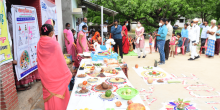Comprehensive National Nutrition Survey (2016-2018)

UNICEF supported Ministry of Health and Family Welfare (MoHFW) to undertake the Comprehensive National Nutrition Survey (CNNS)iv in 2016 with the objective to estimate the prevalence of dual burden of malnutrition and assess the extent and severity of micronutrient deficiencies in children and adolescents as well as to assess risk factors for non-communicable diseases among young and school-aged children and adolescents 10–19 years.
A Technical Advisory Group composed of 12 institutions (government, academia, local and international laboratories, medical institutes, CDC and UNICEF) was formed under the leadership of the MoHFW and designated the Population Council as the lead implementation agency. Beside the provision of technical guidance for the survey design, tools, protocols analysis and report writing, UNICEF was the main funder of the CNNS using its own resources and the generous financial support from Mr and Ms Aditya and Megha Mittal.
CNNS data was collected between March 2016 and October 2018 in all 29 States and Union Territory of Jammu and Kashmir. The report was published in 2019 by the MoHFW, Government of India. Further state-wise reports were also developed for state-level advocacy. Results and trend analysis are available on the HealthNutritionINDIA.in website hosted by MoHFW with UNICEF support.
CNNS is the largest national micronutrient survey ever implemented globally. A total of 112,316 children and adolescents were measured, and care providers interviewed to evaluate infant and young child-feeding practices; 51,029 blood, stool and urine samples were collected and analysed to measure deficiencies in Iron/Anaemia, Iodine, Zinc, Folates, Vitamin A and Vitamin B12 as well as biomarkers for non-communicable diseases.
For the first time in Indian national surveys, the globally accepted SMART data quality assurance method was applied to ensure high anthropometric data reliability and gold standard methods were used to collect samples and analyse micronutrient deficiencies through internationally certified laboratories.


